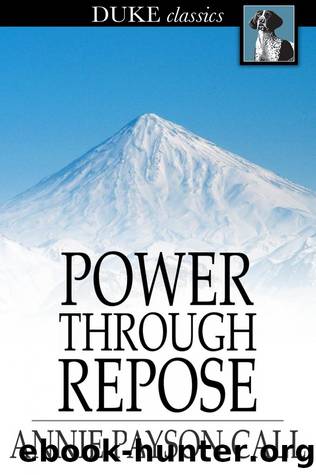Power Through Repose by Annie Payson Call

Author:Annie Payson Call
Language: eng
Format: epub
ISBN: 9781620110188
Publisher: Duke Classics
XIII - Training for Motion
*
"IN every new movement, in every unknown attitude needed in difficult exercises, the nerve centres have to exercise a kind of selection of the muscles, bringing into action those which favor the movement, and suppressing those which oppose it." This very evident truth Dr. Lagrange gives us in his valuable book on the Physiology of Exercise. At first, every new movement is unknown; and, owing to inherited and personal contractions, almost from the earliest movement in a child's learning to walk to the most complicated action of our daily lives, the nerve centres exercise a mistaken selection of muscles,ânot only selecting more muscles than are needed for perfect co-ordination of movement, but throwing more force than necessary into the muscles selected. To a gradually increasing extent, the contracting force, instead of being withdrawn when the muscle is inactive, remains; and, as we have already seen, an arm or leg that should be passive is lifted, and the muscles are found to be contracted as if for severe action. To the surprise of the owner the contraction cannot be at once removed. Help for this habitual contraction is given in the preceding chapter. Further on Dr. Lagrange tells us that "Besides the apprenticeship of movements which are unknown, there is the improvement of already known movements." When the work of mistaken selection of muscles has gone on for years, the "improvement of already known movements," from the simplest domestic action to the accomplishment of very great purposes, is a study in itself. One must learn first to be a grown baby, and, as we have already seen, gain the exquisite passiveness of a baby; then one must learn to walk and to move by a natural process of selection, which, thanks to the contractions of his various ancestors, was not the process used for his original movements. This learning to live all over again is neither so frightful nor so difficult as it sounds. Having gained the passive state described in the last chapter, one is vastly more sensitive to unnecessary tension; and it seems often as though the child in us asserted itself, rising with alacrity to claim its right of natural movement, and with a new sense of freedom in the power gained to shun inherited and personal contractions. Certainly it is a fact that freedom of movement is gained through shunning the contractions. And this should always be kept in mind to avoid the self-consciousness and harm which come from a studied movement, not to mention the very disagreeable impression such movements give to all who appreciate their artificiality.
Motion in the human body, as well as music, is an art. An artist has very aptly said that we should so move that if every muscle struck a note, only harmony would result. Were it so the harmony would be most exquisite, for the instrument is Nature's own. We see how far we are from a realization of natural movement when we watch carefully and note the muscular discords evident to our eyes at all times.
Download
This site does not store any files on its server. We only index and link to content provided by other sites. Please contact the content providers to delete copyright contents if any and email us, we'll remove relevant links or contents immediately.
Letters From a Stoic by Seneca(2797)
The Valmiki Ramayana: Vol. 1 by Bibek Debroy(2410)
The Valmiki Ramayana: Vol. 2 by Bibek Debroy(2269)
The Valmiki Ramayana: Vol. 3 by Bibek Debroy(2216)
Mary Boleyn by Alison Weir(1883)
The Greeks by H. D. F. Kitto(1744)
The Notebooks of Leonardo Da Vinci by Da Vinci Leonardo(1604)
The Classics by Mary Beard(1590)
Mythos (2019 Re-Issue) by Stephen Fry(1568)
The Voynich Manuscript by Gerry Kennedy(1472)
Medea and Other Plays by Euripides(1442)
Art of Living by Sellars John;(1426)
Annals by Tacitus(1410)
Hindoo Holiday by J. R. Ackerley(1383)
Claudius the God by Robert Graves(1290)
Appeasement of Radhika by Muddupalani(1280)
Atlantis the Lost Continent Finally Found by Arysio Santos(1250)
THE REPUBLIC by plato(1248)
Kadambari: Bana by Bana(1228)
